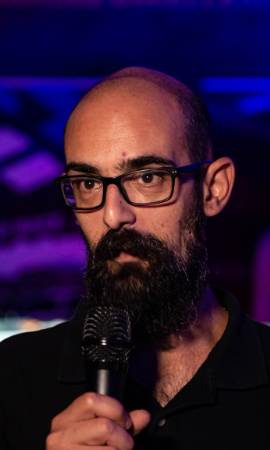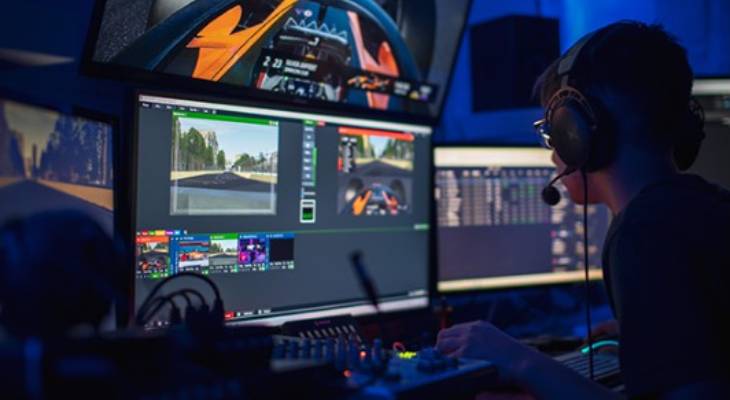As digitalisation continues to dominate the world, the global gaming scene has grown year on year, as more platforms and games are released, the number of players rises, and increased event coverage is provided.
This has also been the case in Malta, with more investment being directed towards the expansion of this everchanging industry. A sign of such progress was the launch of World Pro Racing’s (WPR) sim racing training, development, and entertainment facility last year, featuring 17 sim racing simulators, a private simulation room, a full telemetry and adjudication system, two broadcasting rooms, and a studio for live programmes.
Speaking to WhosWho.mt, WPR Founder and CEO Justin Mifsud explained that while all of this indicates steady growth within the industry, at a local level this progress is still relatively slow, especially in terms of how esports and gaming are perceived by the general public.
“The local esports scene has grown in recent years, yet in a fragmented way, as competition-wise, I have not seen any growth locally since we still have the mentality that we think foreigners and people outside the country are better than us. This is coming from a lack of support towards gamers and prospective esports athletes from their parents and schools, as well as a lack of education,” he said.
Like many other gamers, Mr Mifsud started off playing games for fun, yet there “was always a tunnel that I believed I would go through, which ended up in a career today”. He used to play professionally on a regular basis and had a number of arguments with his parents over playing time, particularly because “parents at the time were not educated enough to understand what the industry has to offer”. This was a common view throughout Maltese society back then, yet he “always believed that it could lead to something big”, persevering through his intense passion for motorsport and esports.
This might not be the case for every esports enthusiast in the country, with many “feeling like they have no purpose in the sector”.
“The growth is increasing when it comes to organisers hosting international events, but on the other hand, local talent is still being restricted,” Mr Mifsud said.

World Pro Racing's sim racing facility
This is one of the reasons why he launched Esports+ in August, the “first-ever” Maltese television programme dedicated to the world of esports. Confident that there is an abundance of local gaming talent, launching Esports+ was also a way to provide gamers with the opportunity to gain exposure, while also boosting their passions to compete.
Another objective for the programme was to target parents that have children playing regularly and to show them that “there is nothing wrong with playing, but you must understand the industry to compete. There must be a plan on how to build a following, grow your confidence, improve your skills, and other factors.”
It is crucial for those around the players understand that “esports is a way of life”, an aspect that still worries Mr Mifsud, particularly since the competitive scene is “nowhere near where it should be”, despite the array of local talent. Yet this “all goes back to the mentality of a lack of commitment and support,” he continued.
When asked about the stigma against esports, particularly since gamers are perceived as antisocial and unhealthy, Mr Mifsud remarked that this is not the case. “While there are some that lock themselves inside and don’t care for their health, we cannot generalise, as overall, gamers need to stay fit, just like in every other sport,” he said.
“Esports does unite people, as players socialise, but there are also others who do not. You have to see from where that is stemming. When it comes to those who are completely antisocial, esports could be the only way gamers save themselves from mental health issues or even more crucially, committing suicide. I don’t know how many times I myself have thought about doing so, wanting to escape the stress of personal problems,” Mr Mifsud explained.
He added that esports is a “way of life” and not something which lonely people can utilise to stay alone and escape society. In reality, “practically no players” simply play alone, as there is always some form of interaction with others, whether directly through multiplayer games, or indirectly by watching online livestreams.
Mr Mifsud called for greater awareness on the value and skills that are gained by gamers who engage in esports, and lamented that it is often used by players as a way to 'escape' the stresses of bullying or other forms of abuse. This is especially so "for men, as society has led many to believe they should not open up about their feelings".
Because of this, many tend to release pent up tension via gaming, however this should not translate into players bottling up their emotions."Essentially, esports is all about helping people, giving them opportunities they never got, and ultimately, having fun," he said .
However, Mr Mifsud noted that some do not tend to fully capitalise on the opportunities they have in the sector, particularly when it comes to media relations. Some players are fearful of streaming their gameplay due to abusive online comments, while others are afraid to speak during interviews. The latter in particular boils down to them not receiving any education on how to talk and present themselves.

Justin Mifsud during The Malta National GT3 Esports Championship 2022 / Facebook
“In order to build a player to be professional, they need to know how to talk and promote their sponsors,” he said, before adding that players also need to promote themselves on social media to “build a following and attract sponsorship deals”, as this can also motivate others and show them that “the door is open to turn professional”.
Speaking about the main idea behind the launch of WPR, Mr Mifsud pointed out that when it initially launched in 2017 as Sim Racing Malta, he had left his jobs and embarked on this journey full-time, to the shock of those around him, as he was “receiving no income” from it.
“With the support of my business partners and through my expertise in esports, I started hosting events with my friends who are into motorsport, and we always had a plan. I had this plan for something like Sim Racing Malta since I was just 15 years old,” he said.
Since it was initially difficult to find sponsors due to the company having Malta in its name, “as many were not interested in expanding to here, not seeing it as profitable to do so,” Mr Mifsud and his partners opted to rebrand and change name by dropping Malta, to “break barriers” and show that while the island is small, “we are capable of doing things because we have the talent to do so”.
“The main idea was to host professional esports events and create a community. WPR is meant for creating events, broadcasting, and promoting drivers, even those still at rookie level,” he said.

World Pro Racing's sim racing facility
Through their background in real motorsport, Mr Mifsud and Co-Founder Adrian Figallo are focusing on translating that experience into the virtual world. When there is a race, they broadcast it, provide the same pre-race briefings as in real-life, the same etiquette, and more.
“We are building drivers from nothing to become professional, and we take our time to explain and help them get something from each race, as it is a learning curve,” Mr Mifsud explained.
Another one of WPR’s goals is to push esports and sim racing to have a greater presence in schools, including teaching the educational institutions themselves to learn more about the sectors. “This is how the esports scene will grow in Malta, by educating the schools, teachers and adults, especially those who have children, and to also continue sharing that across the island like every other field,” he continued.
WPR is now one of the leading event organisers in the scene, reaching a substantial audience on over 20 channels, “putting Malta in the spotlight of the esports world”.
Mr Mifsud also acknowledged that it would not have been possible without the help and support of Gaming Malta and other sponsors, as the Government “believed in our sector and viewership,” and today, WPR is being utilised to “promote the country as a whole”.
WPR has had a hand in the growth of sim racing in Malta through promotion, yet he added that the COVID-19 pandemic heavily contributed to its meteoric rise as well, particularly since real-life drivers could not compete physically and turned to sim racing as an alternative, boosting its popularity. Motorsport is one of Malta’s major sports, and so this continued to assist its rise.
As a result, WPR’s launch was “very well received” and both Mr Mifsud and the company as a whole “have a good reputation within the industry, as people respect us and we take it very seriously, especially when it comes to awareness on bullying and online harassment”.
While its performance has been on the rise, Mr Mifsud is “never satisfied, but in a good way”, as “there are too many things to mention that can double the current performance”.
When asked what message he would give to those interested in delving into the esports world, Mr Mifsud said: “If you have something you want to do, just do it.” He also stressed the importance of taking constructive criticism from others, and to “listen to and evaluate everything, and also commit to whatever you are doing”.
Main Image:
